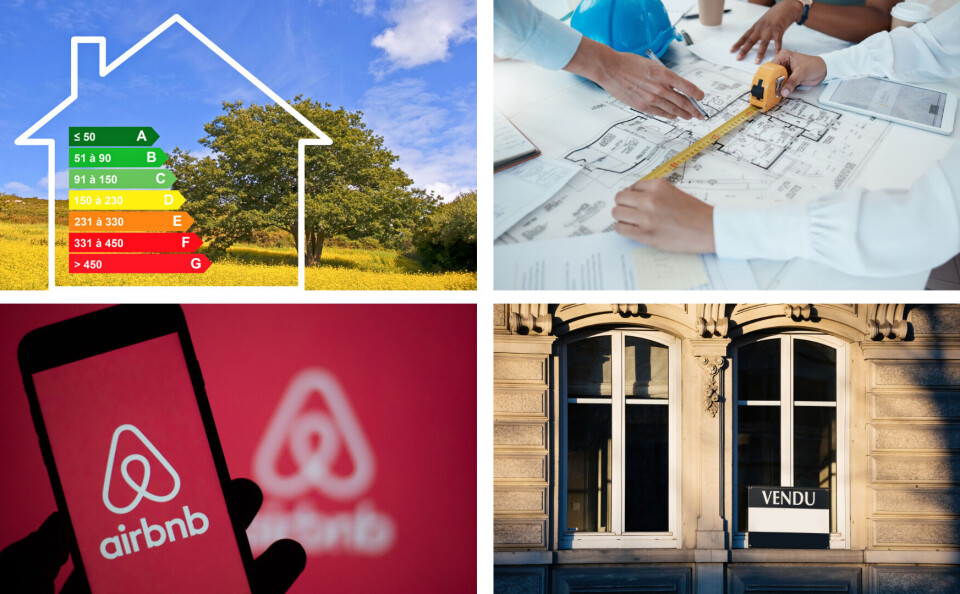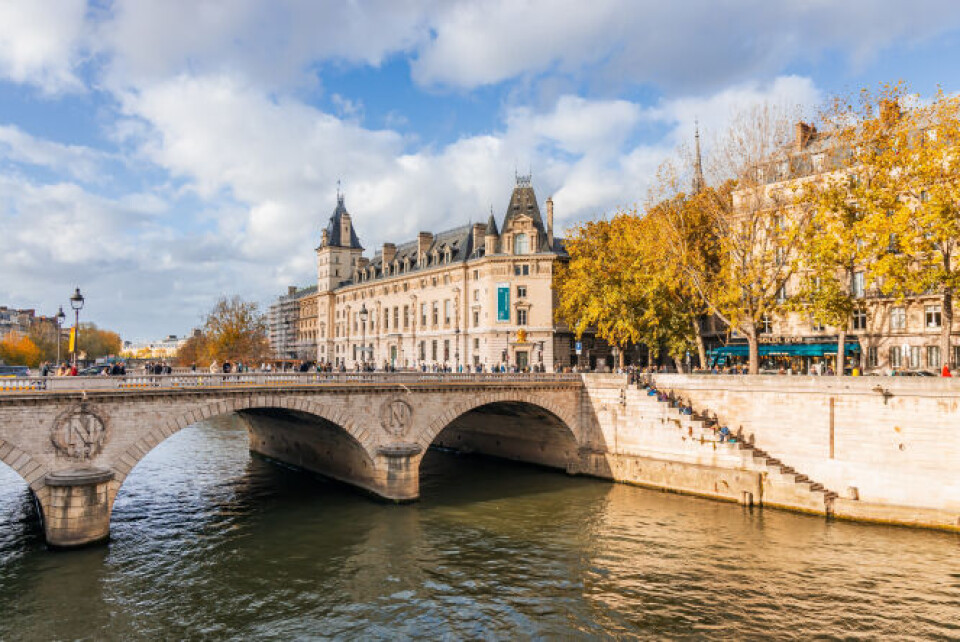-
How long does it take to sell property in different areas of France? New study
Many major cities are showing signs of recovery when it comes to supply, demand, prices, and time to sell
-
Tough Airbnb rules in Marseille prompt many property owners to sell
City council reduce time that a property can be rented to short-term guests
-
France plans crackdown on fraud around obligatory energy ratings for homes
All homes being sold or let need an up-to-date DPE
False energy audit, shrinking Paris flats and priciest French streets
Our weekly round-up of property news in France

Buyers can be compensated for misleading energy information
The buyers of a property with a lower energy rating than claimed have received compensation from the previous owners.
When a property is put up for sale or rent in France, its owner must hire a professional to carry out a diagnostic de performance énergétique (DPE). This uses a graded rating scheme – from A to G – to indicate how energy-efficient the property is and to encourage efforts to reduce its consumption.
Read more: French property sales: Why do some listings not have energy ratings?
In this case, the buyers - who viewed the property in the summer - had been reassured by a DPE rating of B, and only questioned this after moving in.
Lyon Court of Appeal ruled on March 7 that the sellers knew that a poorly built extension to the property, in particular, was difficult to keep warm.
The court said the sellers must have “had knowledge of the defect affecting their house", having lived in it for another 10 years after the extension was built, and ordered them to pay €20,000 in compensation.
The insurer of the builder who carried out the work will also have to pay out after a court expert judged the extension to be “badly designed and executed”.
"The result was that it was impossible to use the bathroom and the ground floor bedroom in winter," the court said. The living room/kitchen area also had “significant and uncomfortable air intakes, aggravated by heat loss,” reports Le Figaro.
Meanwhile, the professional who carried out the energy survey, who was found to be the wife of the estate agent appointed by the sellers, was also ordered to pay €20,000 to the new buyers for misleading information.
The court expert said her score of B was a “poor assessment” of the property, which should have been classified as a D.
However, the former owners were not found equally liable on this issue, as at the time of sale the DPE was for information purposes only. This changed in July 2021 when it became legally enforceable.
Since January, people who own properties with an energy efficiency rating of G – the lowest score possible – and which consume over 450kWH per square metre per year, have no longer been able to rent them out.
The ban is part of a raft of measures in the Loi Climat et résilience to make homes more eco-friendly.
Read more: Home energy efficiency: Key dates for property owners in France
Prospective tenants or homeowners can check whether the DPE they are given is genuine by looking for a 13-digit identification number (or ‘Ademe’ number, for ‘Agence de l'Environnement et de la Maîtrise de l'Énergie’) in the top right-hand corner of the survey.
They can then input this on the official l’Observatoire DPE website under ‘Trouver un DPE’ to ensure it corresponds with official records.
Airbnb property vandalised as tensions rise over short-term holiday lets
Anti-Airbnb protestors have broken into and vandalised an apartment in Marseille in an apparent protest over the explosion of short-term holiday lets, which they say are pushing up long-term rent prices in the city.
Read more: The French tourist cities taking a stand against Airbnb-style lets
The apartment, which is advertised on Airbnb, was ransacked on March 16. Slogans denouncing the holiday platform were sprayed on the walls, furniture and floors, including "Stop Airbnb" and "Les logements c'est pour vivre, pas pour se faire de l'argent" (“Housing is for living, not for making money”).
Une nouvelle étape franchie dans la tension entre habitants et propriétaires : à Marseille, des anti-Airbnb s'introduisent dans un appartement pour le saccagerhttps://t.co/mm4bSH24h7 #airbnb
— Aurélien Viers (@aviers) March 27, 2023
Its owner, identified only as Guillaume, told La Provence it was the second time his property had been targeted in recent months.
"I'm not a foreign investment fund that owns 15 tourist flats. I only have one as the law allows me. I declare everything, I pay taxes, the city collects a tourist tax,” he said.
“This property is for my children when they go to school, and in the long term it will allow me to have an additional income for retirement.”
He initially rented the property long-term but switched to tourist rentals after anti-social behaviour and payment problems with his previous tenants. He will now return to long-term lets again, he says.
Walls in Marseille have been covered with #mortauxvalisesàroulettes (death to wheeled suitcases) slogans for several months, and a recent carnival featured a float made up of multi-coloured suitcases that crush houses, dubbed ‘the Airbnb monster’.
However, Guillaume told La Provence: “They are fighting the wrong people. They think that Airbnb is responsible for the rise in prices and they take the law into their own hands, with impunity. It's not on!
“Tourism creates jobs, it gives life to the city, travellers spend money.”
Earlier this year it was reported that Marseille was among the main recipients of the €148million Airbnb collected in taxes for onward payment to French cities/towns in 2022, alongside Paris and Nice.
Read more: Tourism tax: €148m paid to French communes from Airbnb stays in 2022
Marseille received €2.8million – almost double that of 2021.
The money is for the taxe de séjour (tourism tax) that Airbnb and other tourist rentals in France are required to pay if based in a commune which levies it.
France’s most expensive street is revealed

Connexion readers looking for a more exclusive address for their next French property could do worse than study a new list identifying the most expensive streets per city.
Unsurprisingly, Paris comes out top, with Quai des Orfèvres, located on the Ile de la Cité between Pont Neuf and Pont Saint-Michel, pinpointed as the priciest road to buy on in the entire country.
Here, property goes for an average of €24,194/m², according to the price estimation website Meilleurs Agents.
Rue de Furstenberg (€23,239/m²), near Jardin du Luxembourg in the 6th arrondissement, and Avenue Montaigne (€22,166/m²), known for its designer shops, round out the capital’s top three.
Read more: MAP: See where house prices have risen the most in France
Among the 29 other French cities the website looks at, Nice stands out for having the only other streets in France commanding property prices above €10,000/m², reports Capital. You will need to budget €10,064/m² for a place on Avenue Jean-Lorrain, overlooking the sea, for example.
Read more: The French cities where home insurance is most expensive
Deep pockets will also be required for anything on Avenue Guiseppe Verdi in Aix-en-Provence (€8,393/m²), Avenue Maréchal Lyautey in Marseille (€7,224/m²), Rue Gasparin in Lyon (€7,149/m²) and Rue Mably in Bordeaux (€7,055/m²).
You can see the full list here.
Tenant who benefitted from estate agent negotiations avoids paying fees
A tenant who initially passed up his right of first refusal on the property he was living in – only to claim it once the price had been knocked down for another buyer – does not have to pay estate agency fees, France’s highest court has ruled.
In France, if a landlord decides to sell their property, the tenant has first option to buy it for the marketed price.
If they decide not to, and the landlord subsequently accepts another offer at a lower price, the tenant must once again be given the first right of refusal.
Read more: Do former tenants have a claim on our French house?
In this case, the tenant had moved out of the property, having declined to buy it when it was initially put on the market.
An estate agent then found another buyer for a lower price and a compromis de vente was signed, reports Le Figaro.
When the tenant found out about this through the notaire, he decided to exercise his right to buy the property after all, at the new price. However, he refused to pay the fees the agency would have received from the other buyer.
The agency argued the tenant was just as liable to pay them since he had benefited from their negotiations.
Read more: Can we sue French estate agent over non-sale if price was too high?
However, the Cour de cassation sided with the tenant, ruling this month (March 1) that an estate agent cannot claim to have played a role that would merit remuneration when the tenant always had a legal right to the property.
It was the notaire’s offer he had accepted, not the agent’s, it clarified.
Paris properties are getting smaller
The stereotype of a cramped Paris apartment might need revising down further – a study shows new dwellings in the French capital have decreased in size by 9m² on average in the last 10 years.
The research, published by the urban planning agency l’Institute Paris Region, found that while the construction of new housing increased between 2011 and 2020 in Ile-de-France, these properties have been getting significantly smaller.
It said the reduction in surface area can be explained by a decline in the construction of houses in this time (-9%) and an explosion of flats (+78%), as well as the erosion of household purchasing power as a result of soaring prices.
Read more: MAP: See where apartment prices have risen the most in France
The number of residences for students and the elderly has also increased 2.5 times.
The report said that after a period of sluggishness between 2000 and 2010, the construction of new homes in the Paris region rose by half between 2011 and 2020, from 420,000 in the previous decade (2001-2010) to 660,000. This was largely driven by government targets to build 70,000 homes per year.
The increase in new builds is particularly marked in the inner suburbs of Paris (Hauts-de-Seine, Seine-Saint-Denis, Val-de-Marne).
In the outer suburbs (Yvelines, Val d'Oise, Seine-et-Marne, Essonne), construction has been driven by the need to redevelop neighbourhoods built in the 1960s and 1970s.
Read more: The Paris suburb housing estate that is like no other in France
Another interesting statistic concerns the type of land used for building. Just 19% of urbanised areas for housing were taken from natural agricultural and forest areas from 2016 to 2020, compared with 25% from 2001 to 2005.
This is in part because a reduction in single-family houses has reduced the consumption of space, but also because urban renewal and changes of use are increasing, the report found.
Related articles
Hundreds of estate agents in France are breaking the law
Noisy deliveries, JFK’s holiday home and the dangers of subletting
How Covid changed where people live and work in France
























